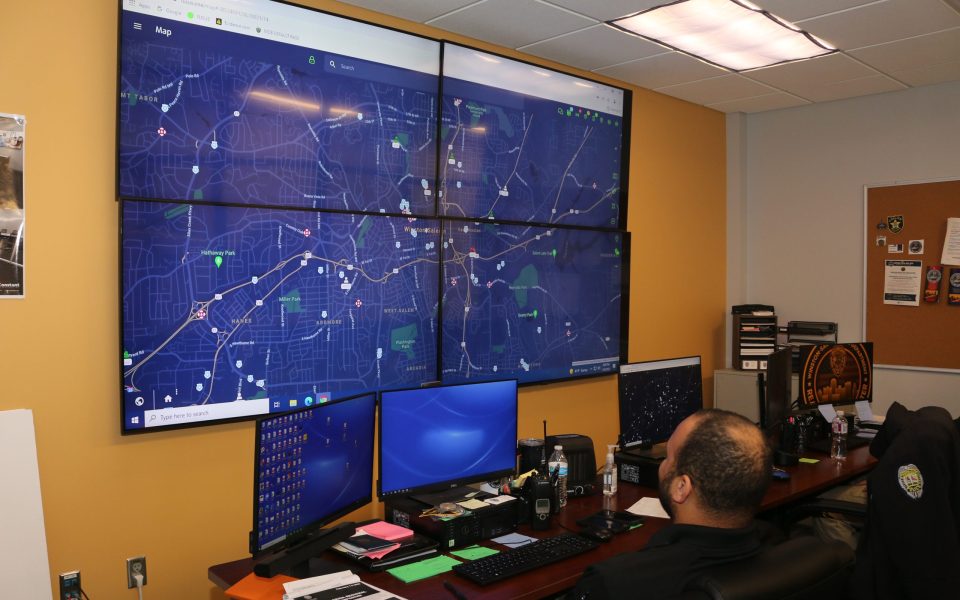Featured photo: Winston-Salem’s Real Time Crime Center is about to get a $700,000 upgrade. (courtesy photo)
Winston-Salem’s Real Time Crime Center is about to get an upgrade.
Last year, the city set up a temporary facility to monitor local crime in real time. The idea is that police officers will be able to solve crimes more quickly because they can see them play out as they take place.
The city established the temporary center while waiting for a $700,000 grant which came through earlier this year for the permanent facility. Using the funds, the city will work with Constant Technologies, a company that specializes in video-wall and technology integration.
“With real-time access, it will ultimately allow us to better serve the community,” said Winston-Salem Police Department Cpl. Brady Ferguson.
The current center contains a wall of monitors, while in the new space there will be individual monitors lined up in rows, each monitoring a camera. Officers assigned to the crime center will sit in front of their own monitors and be able to see both the city map and zoom into specific locations. At some point, officers might be able to see this information through an app, but nothing has been confirmed as of now. Though the city hopes to allow opportunities for the public to come in later, the initial building will only be for those involved with the center. Police Captn. Steve noted that the permanent facility will be much larger than the current one and will hopefully be completed by the end of the calendar year.
Recently, city council also approved the use of a $46,000 grant that will allow local businesses to register their cameras with the police and allow the police to access that footage more quickly in turn. The grant will begin the city’s partnership with Fusus, an Atlanta-based service that uses technology to allow police officers to tap into cameras across the city with the camera owners’ permission. The center will expand just as the grant goes into effect.
“You’re gonna see more of this now that we’re with Fusus, we’re going to try to do some public service campaigns where we share info with the community and educate the community on the program,” said Tollie. “We get questions along the lines of, ‘Is this Big Brother?’ And I want to make it clear to the public that this isn’t what that’s designed to do. The cameras we’re working with are in public areas. Businesses, freeways. And those cameras are already in place. What this tech allows us to do is to use that footage more quickly.”

Real time crime centers are becoming more popular across the country, and more controversial in the wake of George Floyd’s murder and a national conversation around defunding the police. The Lens, a New Orleans-based publication, reported that police used such technology to dispute a workers compensation claim and justify firing three city employees just this month.
In Birmingham, Al., the city approved a reportedly ineffective and racist software for their own center according to BirminghamWatch, as facial recognition technology has a harder time identifying Black faces than white faces.
Locals in Winston-Salem also have concerns.
“I’m just thinking about how Triad Abolition Project and SF Park were directly speaking with the city and in the city council meetings last year asking them not to expand police surveillance,” said TAP’s Bailey Pittenger. “There’s so much going on in the world right now and honestly, TAP is trying to push to have more people involved in city council. There seems to be limited access to raising our voices.”
Advocates for such centers point to their successes. For example, WXII reported that the WSPD was able to use the temporary center in March 2021 to catch suspects in the fatal shooting of a 4-year-old.
Additionally, police were able to solve the kidnapping of a woman and apprehend the kidnapper’s vehicle, resulting in the woman coming away physically unharmed. Several months later, police used the technology to stop a bank robbery and take the offender into custody.
While the center has not been able to stop crime before it happens, Tollie hopes that will change, given the rising gun violence in Winston-Salem.
“It’s two parts,” said Tollie. “It’s certainly assistance in clearing the crimes after they happen, but from a crime prevention standpoint, the more this is advertised, the more people will know we have the ability to access this camera footage.
“Unfortunately, I can’t say we’ve seen a decrease in gun violence,” he continued. “Locally and nationwide, we’ve seen an increase in crime. I do believe the Real Time Crime Center has helped us clear a lot of investigations really quickly, but the numbers are still up.”
Before the implementation of Fusus, Winston-Salem police officers would often go door-to-door after a crime, asking businesses for footage. Assistant City Manager Patrice Toney says the combined Real Time Crime Center and Fusus technology will allow police officers to “do what they’ve always done, just at lightning speed.”
“They are singing its praises,” Toney said. “They absolutely see that it’s effective. It’s helpful in solving crime and speeds up officer’s ability to gather data that otherwise would take a long time to collect. They’re extremely excited about this technology. The expansion of this center, they know for sure it will be effective in solving crime. This has been a tremendous help.”
Toney believes that this approach will keep the Winston-Salem community safer.
“In a time where we’re in a pandemic, that’s a hardship on city staff,” she said. “Having cameras gives the existing staff an extra leg in being able to solve crime. It doesn’t take as much resources.”
Join the First Amendment Society, a membership that goes directly to funding TCB‘s newsroom.
We believe that reporting can save the world.
The TCB First Amendment Society recognizes the vital role of a free, unfettered press with a bundling of local experiences designed to build community, and unique engagements with our newsroom that will help you understand, and shape, local journalism’s critical role in uplifting the people in our cities.
All revenue goes directly into the newsroom as reporters’ salaries and freelance commissions.


[…] this year, the Winston-Salem Police Department obtained a $700,000 upgrade to the crime scene in real time as […]
[…] this year, the Winston-Salem Police Department got a $700,000 upgrade to their real-time crime center, […]
[…] this year, the Winston-Salem Police Department got a $700,000 upgrade to their real-time crime center, […]
[…] this year, the Winston-Salem Police Department got a $700,000 upgrade to their real-time crime center, […]
[…] início deste ano, o Departamento de Polícia de Winston-Salem recebeu uma $ 700.000 em atualizações Também para o centro do crime ao […]